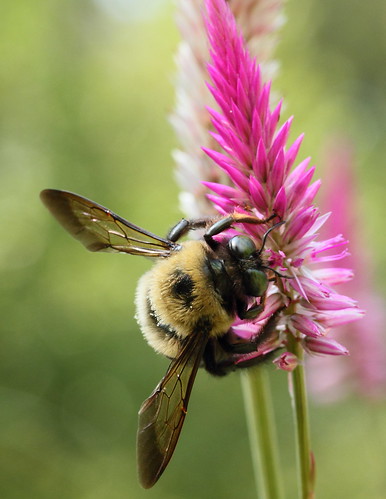 By gluing radio chips to the backs of 800 honeybees, researchers proved that Neonicotinoid pesticides interfere with their behavior. Greg Laden reports that bees exposed to the common aphid-killer "forage abnormally, have 'olfactory memory' problems, are easily disoriented and become poor learners." Fewer of them return to the colony. Laden observes, "One thing that strikes me as especially interesting here is that many bees don't make it back over a fairly long period of time even under normal conditions, and that some bees stay out overnight!" Another likely contributor to Colony Collapse Disorder is a tiny parasitic fly that lays its eggs inside a bee. Dr. Dolittle writes, "scientists have identified a host of potential culprits including pesticides that might weaken their immune systems, pathogens, parasites, and malnutrition." In an age of global agriculture and invasive species, honeybees are threatened on all sides. But they are also vital to the propagation of many fruit and vegetable crops.
By gluing radio chips to the backs of 800 honeybees, researchers proved that Neonicotinoid pesticides interfere with their behavior. Greg Laden reports that bees exposed to the common aphid-killer "forage abnormally, have 'olfactory memory' problems, are easily disoriented and become poor learners." Fewer of them return to the colony. Laden observes, "One thing that strikes me as especially interesting here is that many bees don't make it back over a fairly long period of time even under normal conditions, and that some bees stay out overnight!" Another likely contributor to Colony Collapse Disorder is a tiny parasitic fly that lays its eggs inside a bee. Dr. Dolittle writes, "scientists have identified a host of potential culprits including pesticides that might weaken their immune systems, pathogens, parasites, and malnutrition." In an age of global agriculture and invasive species, honeybees are threatened on all sides. But they are also vital to the propagation of many fruit and vegetable crops.
The Honeybee Bubble
Since everyone is talking
Aggressive African bees were accidentally released in Brazil in 1957.
Bees represent some of the most resilient, adaptable and enterpris
Turns out that honey bees might not have the ideal socialist society after all. Researchers at Otago University in New Zealand have discovered that worker bees behave like drones because of a powerful, brainwashing pheromone released by the queen.